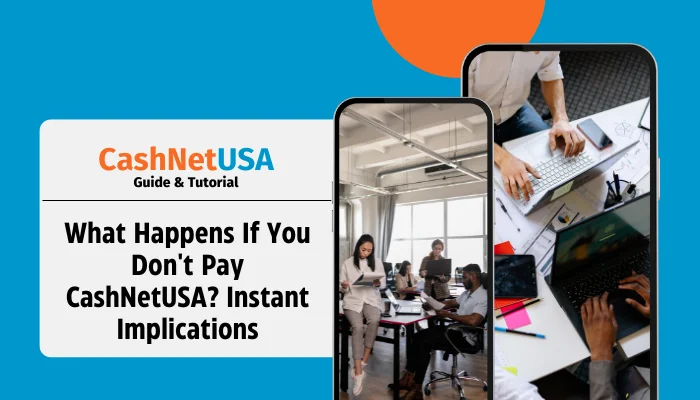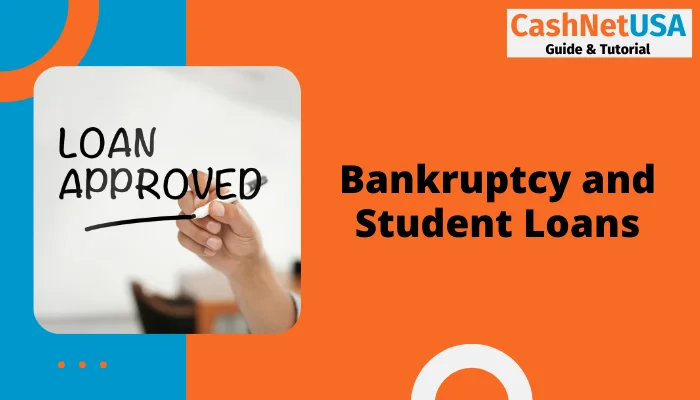What happens if you don’t pay CashNetUSA? Handling student loans can be difficult and sometimes, borrowers find themselves in a situation where they cannot make their payments.
To know what will happen if you don’t pay CashNetUSA, may provide an insight about the consequences and alternatives available.
This guide gives valuable strategies to manage as well as possibly overcome this financial burden and examines the effects of defaulting on your student loans.
Understanding ‘has anyone not paid back CashNetUSA‘ can provide additional insights into potential consequences.

What Happens If You Don’t Pay CashNetUSA? Instant Implications
Understanding what happens if you don’t pay CashNetUSA student loans starts with realizing some immediate implications of missing payment. Consequences vary depending on the kind of loan as well as how late it is.
Delinquency
Your loan goes into delinquency once you miss a payment. Being one day after missing a payment, delinquency lasts until the account is brought back to normal. Generally, during this time, 90 days later, your loan servicer usually communicates this delinquency to all credit bureaus resulting in a low credit score.
Accrued Interest and Late Fees
Interest keeps increasing on your outstanding balance during delinquency which increases the amount owed overall. Also, fines might be added to the account making it more difficult for one to catch up with payments.
Contact from Loan Servicer
Loan servicers will try reaching out by phone calls, emails and letters reminding you of the missed due date but also discussing repayment options. Ignoring these communications may lead to further serious outcomes.
Defaulting on Your Student Loans
Eventually, if arrears continue piling up, your loan becomes defaulted. It is therefore important that we understand what happens if you don’t pay CashNetUSA student loans and how we can avoid it happening.
Federal Student Loan Default
In case federal student loans have gone unpaid for 270 days default commences. Once defaulted everything has been settled now at once.
The US government wields various tools for collecting defaulted student loans such as wage garnishment, tax refund offsets and benefit garnishments from your social security. Considering ‘has anyone not paid back CashNetUSA’ can offer real-world examples of what happens in such situations.
Private Student Loan Default
On the other hand, private student loans have different default terms that often commence after missing payment for 120 days. If it is necessary to collect the debt, lenders may sue you which in turn could result in wage garnishment or asset seizure should a court judgment be obtained.
Credit Score Implication
What happens if you don’t pay CashNetUSA, one of the consequences is that it might affect your credit score really badly.
This will make life very difficult for you as it will affect any future credit, accommodation or even employment. The default status can hang around on your credit report for up to seven years and this can impact your financial wellbeing in the long run.
Loan Rehabilitation and Consolidation
Knowing what happens if you don’t pay CashNetUSA loans is only part of the answer. By considering alternatives that lead out of defenestration like loan rehabilitation and consolidation you are taking back control of your finances.
- Loan Rehabilitation: Loan Rehabilitation – series of agreed payments intended to bring a federal student loan out of default. Successful rehabilitation can remove the default status although late payments persist on your record.
- Loan Consolidation: Combining your federal student loans under a Direct Consolidation Loan can be a way to get out of default. It takes several loans and forms them into one loan with a fixed rate of interest. While it does not erase the default entry from your credit report, consolidation could help simplify payment and potentially reduce your monthly bills.
- Private Loan Solutions: For private loans, options are more limited, but contacting your lender to discuss alternative repayment plans, settlement offers, or loan modifications can provide some relief. Understanding has anyone not paid back CashNetUSA can also offer insights into potential solutions for private loans.
Exploring Income-Driven Repayment Plans
Income-driven repayment (IDR) plans are intended to make federal student loan payments more affordable by basing them on your income and family size. They are vital in managing what happens if you don’t pay CashNetUSA loans and preventing defaults.
Types of IDR Plans
A number of IDR plans exist including:
- Income-Based Repayment (IBR)
- Pay As You Earn (PAYE)
- Revised Pay As You Earn (REPAYE)
Each plan specifies different eligibility requirements and ways of calculating payments.
Benefits of IDR Plans
These schemes may significantly lower the monthly payments for borrowers as well as offer forgiveness benefits after 20 or 25 years of qualifying repayments. Enrolling in an IDR plan can prevent delinquency and default, allowing you to better manage your student debt burden.
Application Process
This will entail submitting an income-driven repayment plan request form to your loan servicer when applying for an IDR plan. Your earnings details and dependent information will also need to be submitted since they will be required during computation of the amount to be paid each month.
Deferment and Forbearance Options
Both deferment and forbearance allow you temporarily halt paying your student loans or reduce the amount due. Although these choices bring forth interim relief it is vital to understand how this affects what happens if you don’t pay CashNetUSA.
Deferment
Deferment means that federal student loan payments do not need to be made for a period of time. During deferment, subsidized loan borrowers do not have interest growing on their balances; however, unsubsidized loan recipients still accrue interest. Examples of common deferments include:
- In-school deferment
- Unemployment deferment
- Economic hardship deferment
Forbearance
It allows you to temporarily reduce or stop making payments on your federal or private student loans. Forbearance on all loans incurs interest during the period thus increasing the amount due. General and mandatory forbearance options are available based on your circumstances.
Impact on Long-Term Repayment
Deferment and forbearance can provide temporary relief but may result in an increase of your outstanding balance due to accrued interest. Thus, they must be used strategically as well as other repayment plans considered in order to avoid long-term financial strains.

Bankruptcy and Student Loans
This is usually considered as one last option where there is no way out of debt situation. However, understanding about people who have defaulted on CashNetUSA student loans within the context of bankruptcy is important because these types of loans cannot generally be discharged through bankruptcy proceedings.
Undue Hardship Exception
To discharge student loans in bankruptcy, you must prove that repaying the loans would cause undue hardship. This involves filing an adversary proceeding and satisfying Brunner test’s criteria which require that:
- You lack sufficient income to maintain a minimal standard of living while paying off the debt.
- There exists no future possibility that you will come out of this financial situation.
- Your repayments were done with only honest intentions.
Impact on Federal and Private Loans
Both types of student loan come under the undue burden test. Getting a student loan discharged in bankruptcy is difficult, requiring substantial evidence and representation.
Alternatives to Bankruptcy
Start by exploring other options before thinking about filing for bankruptcy. Some of these alternative repayment methods include income driven repayment plans, consolidation and loan rehabilitation among others. You may also consider consulting with a bankruptcy attorney to explain your choices and potential outcomes.
Valuable Resources for Student Loan Borrowers
Several government agencies and non-profit organizations offer free resources as well as counseling to student loan borrowers. Here are some good starting points:
| Federal Student Aid: (https://studentaid.gov/) This website provides information on federal student loans programs, loan forgiveness programs, and options of repaying. Consumer Financial Protection Bureau (CFPB): (https://www.consumerfinance.gov/) It has several resources plus tools that you can use in understanding the student loans you have and how to manage the debt well. American Student Assistance: (https://www.asa.org/) This nonprofit organization provides free counseling services on behalf of the students who borrowed some money. |
Utilizing these resources alongside researching available payment options can help develop an affordable program which will allow you avoid defaulting the loans.
Remember, there is help available. Rather than face catastrophic consequences due to lack of payment it is always better to be proactive when challenges arise around a students’ student loans.
Seeking Professional Help
Managing your student loan debt can be a maze therefore seeking professional help could be valuable in guiding you through this process. Change “has anyone not paid back CashNetUSA” into what has anybody not paid back CashNetUSA mean regarding getting expert assistance?
- Credit Counseling: Credit counseling agencies offering debt management services typically provide no-cost or low-cost budgeting support as well as partial debt settlement advice. Default prevention guidance offered by such providers also covers how best to navigate the loan rehabilitation process.
- Financial Advisors: A financial planner can help you create a comprehensive financial plan that includes strategies for managing your student loans. If possible, seek help from investment professionals who also have knowledge about retirement savings and overall financial well-being.
- Legal Assistance: If you are looking at default, wage garnishment, or legal action, it could be wise to consult a lawyer who specializes in student loan debt. This will ensure that you understand your rights negotiating with the lenders and also trying out legal remedies where necessary.
Building a Sustainable Financial Future
Understanding what happens if you don’t pay CashNetUSA loans is important but creating a sustainable financial future requires ongoing financial literacy and proactive steps.
Creating a Budget
Developing an itemized budget is crucial as this will guide your money management and ensure ability to make payments towards your student loan. Monitor your income plus expenditure so as to identify areas for cutting costs as well as prioritizing debt repayment.
Emergency Fund
By establishing an emergency fund one can create a buffer against unexpected expenses thus reducing the likelihood of missing loan payments. A separate savings account is advised with at least 3-6 months’ worth of living expenses being saved here.
Continuing Financial Education
Furthering your education on personal finance will empower you into making sound decisions while avoiding potential problems which may lead to loss of money in future. Enhance your knowledge by attending training workshops, reading different books and consulting qualified financial advisors.
Peer Insights and Experiences
Understanding has anyone not paid back CashNetUSA loans can provide valuable insights into the experiences of other borrowers and offer practical advice for managing student loan debt.
| Success Stories: Numerous students have been able to handle their loans helpfully through various means like enrolling in income driven repayment plans and loan forgiveness plan. It is a good idea to look into such success stories as they can provide motivation as well as useful ideas. Challenges And Lessons Learned: Knowing about what other borrowers experienced and the lessons they learned would prevent you from common pitfalls and enable you make better choices. Be part of online forums or support groups that are relevant for your situation. Seeking Support: Your colleagues, family and finance professionals may give you positive advice on how to pay off your student loan debts throughout the process of repaying them. By sharing your experiences with other people, you would be able to remain focused on your financial goals while drawing insights from others’ experiences. |
Conclusion
Understanding what happens if you don’t pay CashNetUSA student loans will go a long way towards helping you manage debt and maintain financial health.
The consequences for missed payments, delinquency and default can be severe but there are many alternatives open to assist in getting things back under control.
Your financial situation could however dictate a solution that works best for your case like seeking the services of credit counselors, financial advisors, legal experts etc.
Lacking these options present valuable guidance and support which can also be obtained by consulting professional aid from credit counselors, financial advisors or legal experts among others.
In conclusion therefore it is important that we keep ourselves updated with information regarding our fees thus asking for assistance when required hence staying away from problems resulting out of cost charges.
